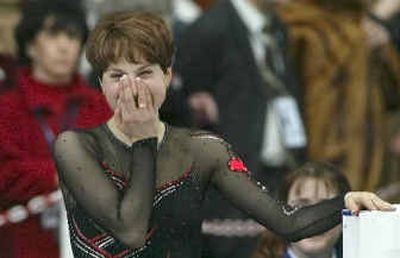Is figure skating dead?

CHICAGO – After one year as the U.S. broadcaster for international figure skating events, ESPN is so exasperated with the sport’s world governing body the TV network wonders how it will get through the contract’s final three years.
Ratings for the three nights of event coverage at the recent world championships were so poor ESPN is questioning the value of the $5 million-a-year rights fee it paid the International Skating Union.
ESPN officials even have discussed using what they feel are breaches of the contract by the ISU as grounds to end the deal.
Speaking on condition of anonymity, an ESPN official told the Chicago Tribune the network still intends to finish the contract but will also “play hardball” to enforce existing terms and get changes in scheduling and other areas.
One such change might be the addition of Dick Button to the worlds broadcast team despite the ISU’s discomfort with the man who has been the voice of figure skating in the United States for 40 years.
First, the ratings: 0.78 for the Thursday telecast, 0.84 for Friday and 1.24 for Saturday. To borrow the way USA Today’s Michael Hiestand has described similar ratings for other sports: the numbers were so low they may have been the result of the family pet accidentally sitting on the remote control.
Those numbers – especially Saturday’s, for the usually attractive women’s short and long programs – shocked ESPN officials, who expected ratings in the 2-to-2.5 range.
Factored for percentage of cable penetration, the Saturday rating would be about 1.0 on over-the-air network TV. That is more than five times lower than the 5.4 the Saturday worlds telecast drew on ABC in 2004 and the 5.2 in 2003.
“The idea that figure skating is dead in the United States has gone through my head,” said Pat Lowery, the ESPN coordinating producer for figure skating. “Now we need to find out what we can do to revive it.
“We’re going to embrace skating. As frustrating as the process may be, we are really going to try to grow it. We want to increase the amount of skating on ESPN.”
World meet ratings were good in Canada, where the CBC saw a 17-percent increase over 2004, and Japan, where the women’s free skate (18 share) was the most-watched sports program of the week.
Lowery guessed the dramatic plunge in the U.S. owed in part to viewers’ failure to realize ESPN had taken over broadcast duties from ABC. This was the first world meet not shown on over-the-air TV in the U.S.
“Those ratings are what happens when you go to cable,” said Eddie Einhorn, who has negotiated U.S. and international figure skating TV deals.
Skating’s best cable rating ever was 3.4 for ABC Family’s live coverage of the women’s final at the 2002 U.S. championships/Olympic trials. The Saturday telecast of the 2005 U.S. championships drew 4.6 on ABC.
U.S. interest in figure skating had been so inflated by the aftermath of the 1994 Harding-Kerrigan affair that ABC paid the ISU $22.5 million annually in the five-year deal that expired last year.
ESPN was the only bidder for ongoing U.S. rights, leaving the ISU to eat humble pie – and only a couple of slices. The rest of the ISU’s international TV rights sales add up to less than $5 million.
The international federation figured it would save some face when ESPN submitted Button’s name in original discussions about broadcasters it intended to use for the 2005 worlds. The ISU response was to eliminate Button, a frequent antagonist who publicly supported the late World Skating Federation, which made a quixotic attempt to gain control of the sport.
ESPN apparently chose not to press the issue because of entanglements with International Management Group, which represents the ISU and also provides programming to ESPN.
“I was on St. Bart’s having a wonderful time, but I still would have traded it for the snows of Moscow,” Button said. “I have no idea what the ISU said to ESPN. It isn’t the first dinner party I wasn’t invited to.”
ISU President Ottavio Cinquanta was irritated in Moscow by a Tribune question suggesting the organization had nixed Button.
“I never spoke of such a limitation, and I exclude the possibility that the ISU could have put such a limitation (on the broadcast team),” Cinquanta insisted.
The quality of the broadcast capabilities the ISU provided became a bigger problem than the broadcasters issue. The contract for worlds promised ESPN more cameras than the host broadcaster delivered, and the contract for the European championships promised a “clean feed” (no graphics, etc.) that the host broadcaster did not provide.
ISU spokesman Rowland Jack said in a Thursday e-mail the federation makes its “best efforts” to ensure contractual prohibitions against Internet streaming are respected.